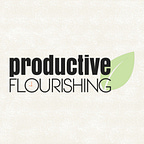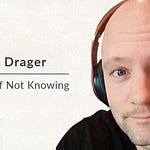Topics We Explored:
On today’s episode, Angela sits down with Charlie to talk about debt.
As they came to the end of the podcast season, they wanted to share some of the conversations they’ve had in their household as well as with their clients.
We can think of debt as how much money we owe others, or economic debt, but the focus of today’s podcast is other types of debt that can weigh us down.
Charlie and Angela talk about how debt in one area of our lives can affect all other areas, and getting over the shame can help us move forward into abundance.
Links and Resources Mentioned in This Episode:
Thanks for Listening!
Subscribe to Productive Flourishing on Apple Podcasts to get all the latest episodes delivered straight to your preferred mobile device. This is the perfect option for listening to the show in the car, on the subway, or while you’re working out. Plus, you won’t have to fuss with figuring out how you’re going to listen.
Episode Timestamps
[3:00] - One of the conversations Charlie and Angela have been having lately is about debt. There are other forms of debt that weigh us down just the same as financial or economic debt. If you’re behind on a project, you might be in project debt. Just like with financial debt, it’s hard to get ahead because you’re trying to pay off the project debt while being presented with new tasks or projects. You can get stuck in a cycle of not making headway on the debt you already have, but also not saying no to new debt going forward.
[4:50] - Bankruptcy can be a helpful term to apply to other kinds of debt, besides financial debt. If you’re presented with a lot of great opportunities you’re unable to engage with because of project debt from the past, you might call bankruptcy on that project and just let it be done. It’s not always an easy decision to make, but it’s important to listen to how our desires, energy, and focus evolve over time.
[7:00] - The idea of debt and bankruptcy is an interesting concept when you start applying it to different areas of your life. There are many areas in life that we get behind and we’re not getting what we need. At this point, you have to stop and evaluate what it’s costing you to move forward in your current path.
[8:15] - A lot of times, there is an emotional cost to owning a project. When you’re getting the project done, it can fuel you. On the flip side, when no progress is being made, it can be emotionally draining. Having a project that you’re not working on creates interest that you continually have to pay until you discharge it.
[9:35] - There is some shame associated with project debt. It may be true that the way we manage our time and priorities leaves us in debt. However, that doesn’t have to be a source of shame. Once we get past the shame story, we can move into a time of recovery.
[13:35] - It’s easy to let the debt in one area of our lives show up in every other area of our lives. Angela talks about how when she’s experiencing sleep debt, she is usually also experiencing project debt and relationship debt. This goes back to the idea Charlie mentioned earlier about symbiosis, and the idea that different parts of our lives can start to support each other.
[17:15] - Charlie talks about the Greek nature of nemeses, and how our nemesis comes when we refuse to accept our limit. Until we embrace and work with that limit, our nemesis will always show up, because we’ve likely borrowed from other reserves in our lives. We need to take care of ourselves, because we can’t go all out all the time. Most creative people have some type of meditation practice that grounds them. If you can make 15 minutes of a meditation practice a priority, you can make other things a priority too.
[22:10] - Often times we are aware that we have too much going on, but we can’t let it go. Really looking internally to figure out your priorities is a way to begin to let go. You might have debts that you’ve taken on, but may come to realize that you don’t have to pay and see them through.
[23:40] - We get into debts because we don’t recognize our limits. We all have limits, and we cannot be, do, and have it all. It’s up to us to determine what those limits are in the different areas of our lives. When you give yourself permission to not be everything, you can work on finding your authentic core and make sure that’s how you’re showing up in your relationships.
[27:15] - There isn’t enough time and energy for everything, but there is enough time and energy for the things that matter. We let the fear of missing out push us past our limits, and end up missing out on those things that matter most. The beauty of debt is that when you embrace debt, you can also embrace surplus at the same time.
[30:15] - Wrapping our minds around the idea of limits can be saddening in some ways, and exciting and exhilarating in other ways. For Angela, it gave her the reassurance that it’s okay to ask for help. The people who are most successful in life know where their limits are, and know when they need to ask for help. Asking for help doesn’t mean that you’ve given up, or that you’re not enough.
[32:50] - When you’re suffering, it’s hard to thrive. The message of hope for this podcast is that as you move forward, you suffer less and thrive more. Try to let go of the shame and see what you can do to get yourself out of debt and create the abundance that you want.












